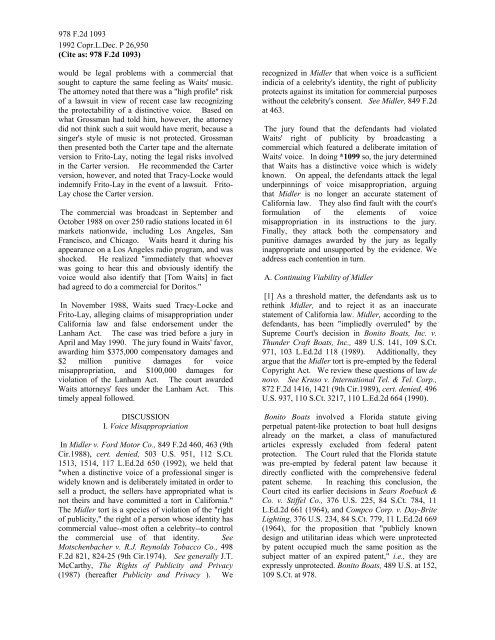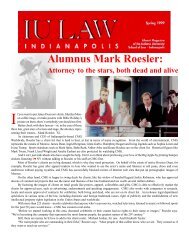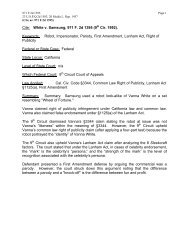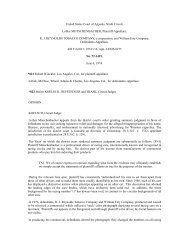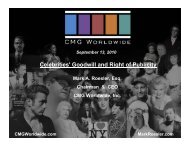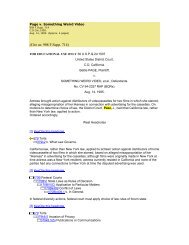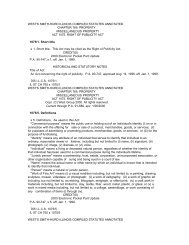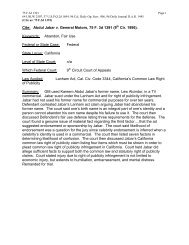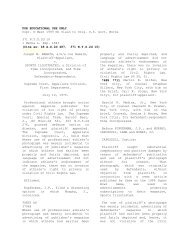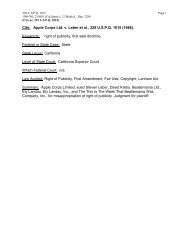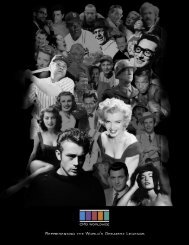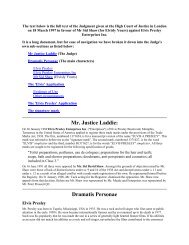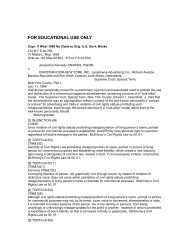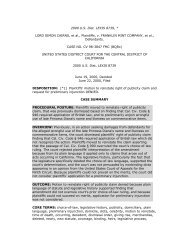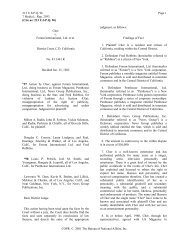Cite: Waits v. Frito Lay, 978 F. 2d 1093 (9th Cir. 1992 ... - Mark Roesler
Cite: Waits v. Frito Lay, 978 F. 2d 1093 (9th Cir. 1992 ... - Mark Roesler
Cite: Waits v. Frito Lay, 978 F. 2d 1093 (9th Cir. 1992 ... - Mark Roesler
Create successful ePaper yourself
Turn your PDF publications into a flip-book with our unique Google optimized e-Paper software.
<strong>978</strong> F.<strong>2d</strong> <strong>1093</strong><br />
<strong>1992</strong> Copr.L.Dec. P 26,950<br />
(<strong>Cite</strong> as: <strong>978</strong> F.<strong>2d</strong> <strong>1093</strong>)<br />
would be legal problems with a commercial that<br />
sought to capture the same feeling as <strong>Waits</strong>' music.<br />
The attorney noted that there was a "high profile" risk<br />
of a lawsuit in view of recent case law recognizing<br />
the protectability of a distinctive voice. Based on<br />
what Grossman had told him, however, the attorney<br />
did not think such a suit would have merit, because a<br />
singer's style of music is not protected. Grossman<br />
then presented both the Carter tape and the alternate<br />
version to <strong>Frito</strong>-<strong>Lay</strong>, noting the legal risks involved<br />
in the Carter version. He recommended the Carter<br />
version, however, and noted that Tracy-Locke would<br />
indemnify <strong>Frito</strong>-<strong>Lay</strong> in the event of a lawsuit. <strong>Frito</strong>-<br />
<strong>Lay</strong> chose the Carter version.<br />
The commercial was broadcast in September and<br />
October 1988 on over 250 radio stations located in 61<br />
markets nationwide, including Los Angeles, San<br />
Francisco, and Chicago. <strong>Waits</strong> heard it during his<br />
appearance on a Los Angeles radio program, and was<br />
shocked. He realized "immediately that whoever<br />
was going to hear this and obviously identify the<br />
voice would also identify that [Tom <strong>Waits</strong>] in fact<br />
had agreed to do a commercial for Doritos."<br />
In November 1988, <strong>Waits</strong> sued Tracy-Locke and<br />
<strong>Frito</strong>-<strong>Lay</strong>, alleging claims of misappropriation under<br />
California law and false endorsement under the<br />
Lanham Act. The case was tried before a jury in<br />
April and May 1990. The jury found in <strong>Waits</strong>' favor,<br />
awarding him $375,000 compensatory damages and<br />
$2 million punitive damages for voice<br />
misappropriation, and $100,000 damages for<br />
violation of the Lanham Act. The court awarded<br />
<strong>Waits</strong> attorneys' fees under the Lanham Act. This<br />
timely appeal followed.<br />
DISCUSSION<br />
I. Voice Misappropriation<br />
In Midler v. Ford Motor Co., 849 F.<strong>2d</strong> 460, 463 (<strong>9th</strong><br />
<strong>Cir</strong>.1988), cert. denied, 503 U.S. 951, 112 S.Ct.<br />
1513, 1514, 117 L.Ed.<strong>2d</strong> 650 (<strong>1992</strong>), we held that<br />
"when a distinctive voice of a professional singer is<br />
widely known and is deliberately imitated in order to<br />
sell a product, the sellers have appropriated what is<br />
not theirs and have committed a tort in California."<br />
The Midler tort is a species of violation of the "right<br />
of publicity," the right of a person whose identity has<br />
commercial value--most often a celebrity--to control<br />
the commercial use of that identity. See<br />
Motschenbacher v. R.J. Reynolds Tobacco Co., 498<br />
F.<strong>2d</strong> 821, 824-25 (<strong>9th</strong> <strong>Cir</strong>.1974). See generally J.T.<br />
McCarthy, The Rights of Publicity and Privacy<br />
(1987) (hereafter Publicity and Privacy ). We<br />
recognized in Midler that when voice is a sufficient<br />
indicia of a celebrity's identity, the right of publicity<br />
protects against its imitation for commercial purposes<br />
without the celebrity's consent. See Midler, 849 F.<strong>2d</strong><br />
at 463.<br />
The jury found that the defendants had violated<br />
<strong>Waits</strong>' right of publicity by broadcasting a<br />
commercial which featured a deliberate imitation of<br />
<strong>Waits</strong>' voice. In doing *1099 so, the jury determined<br />
that <strong>Waits</strong> has a distinctive voice which is widely<br />
known. On appeal, the defendants attack the legal<br />
underpinnings of voice misappropriation, arguing<br />
that Midler is no longer an accurate statement of<br />
California law. They also find fault with the court's<br />
formulation of the elements of voice<br />
misappropriation in its instructions to the jury.<br />
Finally, they attack both the compensatory and<br />
punitive damages awarded by the jury as legally<br />
inappropriate and unsupported by the evidence. We<br />
address each contention in turn.<br />
A. Continuing Viability of Midler<br />
[1] As a threshold matter, the defendants ask us to<br />
rethink Midler, and to reject it as an inaccurate<br />
statement of California law. Midler, according to the<br />
defendants, has been "impliedly overruled" by the<br />
Supreme Court's decision in Bonito Boats, Inc. v.<br />
Thunder Craft Boats, Inc., 489 U.S. 141, 109 S.Ct.<br />
971, 103 L.Ed.<strong>2d</strong> 118 (1989). Additionally, they<br />
argue that the Midler tort is pre-empted by the federal<br />
Copyright Act. We review these questions of law de<br />
novo. See Kruso v. International Tel. & Tel. Corp.,<br />
872 F.<strong>2d</strong> 1416, 1421 (<strong>9th</strong> <strong>Cir</strong>.1989), cert. denied, 496<br />
U.S. 937, 110 S.Ct. 3217, 110 L.Ed.<strong>2d</strong> 664 (1990).<br />
Bonito Boats involved a Florida statute giving<br />
perpetual patent-like protection to boat hull designs<br />
already on the market, a class of manufactured<br />
articles expressly excluded from federal patent<br />
protection. The Court ruled that the Florida statute<br />
was pre-empted by federal patent law because it<br />
directly conflicted with the comprehensive federal<br />
patent scheme. In reaching this conclusion, the<br />
Court cited its earlier decisions in Sears Roebuck &<br />
Co. v. Stiffel Co., 376 U.S. 225, 84 S.Ct. 784, 11<br />
L.Ed.<strong>2d</strong> 661 (1964), and Compco Corp. v. Day-Brite<br />
Lighting, 376 U.S. 234, 84 S.Ct. 779, 11 L.Ed.<strong>2d</strong> 669<br />
(1964), for the proposition that "publicly known<br />
design and utilitarian ideas which were unprotected<br />
by patent occupied much the same position as the<br />
subject matter of an expired patent," i.e., they are<br />
expressly unprotected. Bonito Boats, 489 U.S. at 152,<br />
109 S.Ct. at <strong>978</strong>.


